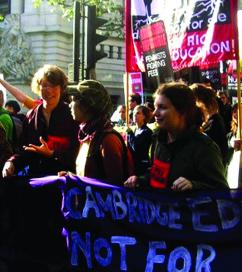CUSU attacks Student Survey
CUSU calls National Student Survey a waste of money
CUSU is urging all final year students to opt out of the National Student Survey for the third year in a row.
 CUSU has attacked the National Student Survey (NSS), describing it as “a huge waste of government money”, “irrelevant to the Cambridge experience”, and “harmful to current internal feedback mechanisms”. CUSU has also expressed concern at the “aggressive” marketing used, which they claim “will harass students during a very busy time of the academic year”. A full-scale campaign is being launched to promote their anti-NSS policy: posters are being distributed around colleges, and a facebook group “Opting Out of the NSS” is attracting an increasing number of members. JCRs are also being encouraged to oppose the NSS, and to mark promotional NSS t-shirts with “Opt Out” or to recycle them. CUSU are currently working on anti-NSS t-shirts.
CUSU has attacked the National Student Survey (NSS), describing it as “a huge waste of government money”, “irrelevant to the Cambridge experience”, and “harmful to current internal feedback mechanisms”. CUSU has also expressed concern at the “aggressive” marketing used, which they claim “will harass students during a very busy time of the academic year”. A full-scale campaign is being launched to promote their anti-NSS policy: posters are being distributed around colleges, and a facebook group “Opting Out of the NSS” is attracting an increasing number of members. JCRs are also being encouraged to oppose the NSS, and to mark promotional NSS t-shirts with “Opt Out” or to recycle them. CUSU are currently working on anti-NSS t-shirts.
According to the Higher Education Funding Council for England (HEFCE) who run the annual survey, the aim of the NSS is to “gather feedback on the quality of students’ courses” at HE institutions, and to aid prospective applicants in their selection of a university and course.
you might wonder whether Cambridge has something to hide
But CUSU has criticised the survey, calling the questions “over-simplistic to the point of meaninglessness”. CUSU President Mark Ferguson told Varsity that “the results of the NSS may be useful to some prospective students, but not those wishing to apply to Cambridge”. He argues that the questions do not accurately reflect the Cambridge student experience. Ferguson added that it is impossible to rate all HE institutions and their students according to a “one size fits all” model, and “neither should any survey which wishes to be a useful indicator of university performance”.
Louisa Baker, speaking on behalf of HEFCE, defended the NSS, arguing that its value can be seen in the “significant changes” universities are already making “as a direct result of feedback given”. In response to CUSU’s criticism, Baker pointed to the introduction of a section in which institutions can add further questions of their own. She also highlighted the dangers of opting out, saying, “If you put yourself in the position of a sixth former looking at the NSS results… you might wonder whether Cambridge has something to hide if its results do not appear.”
CUSU is also concerned that the marketing methods and publicity strategies used by IPSOS-Mori, the company contracted to carry out the survey, are “aggressive” and “intrusive”. Several stages are involved in the process of contacting students. Initially student data is collected from HE institutions and a promotional campaign is launched in early January to advertise the NSS to students. Those who do not either complete the five-minute survey or opt out are then contacted by email; non-respondents are sent a postal letter, and IPSOS-Mori will then attempt to contact remaining students via telephone up to eight times until a response is received. Sami Benyahia, NSS Project Manager at IPSOS-Mori, admitted, “Yes, it is a multi-method attempt to achieve correspondence, but we do not bombard students.” When asked if he considered their method to constitute a harassing manner, Benyahia said, “If you saw eight missed calls on your phone I would agree, you might wonder who it is and why they kept calling; but these calls are not made all at the same time.” He added that “70 per cent of people are reached within three to four attempts” by telephone.
The NSS only publishes results of institutions that have at least a 60 per cent response rate, and over the two years that the survey has been running, Cambridge’s response has fallen below this target. CUSU are hoping that this trend will continue in 2007. Students can opt out of the survey on the NSS website, by telephone or by returning the postal survey incompleted.
This year’s Cambridge finalists will be contacted by IPSOS-Mori this term as the University has passed on finalists’ details. A Cambridge University spokesperson acknowledged CUSU’s position and said the University “will be contacting all final year students shortly”.
Nikki Burton
 News / Right-wing billionaire Peter Thiel gives ‘antichrist’ lecture in Cambridge6 February 2026
News / Right-wing billionaire Peter Thiel gives ‘antichrist’ lecture in Cambridge6 February 2026 News / Man pleads guility to arson at Catz8 February 2026
News / Man pleads guility to arson at Catz8 February 2026 News / Epstein contacted Cambridge academics about research funding6 February 2026
News / Epstein contacted Cambridge academics about research funding6 February 2026 News / John’s duped into £10m overspend6 February 2026
News / John’s duped into £10m overspend6 February 2026 News / Cambridge students uncover possible execution pit9 February 2026
News / Cambridge students uncover possible execution pit9 February 2026








